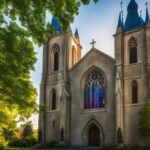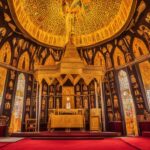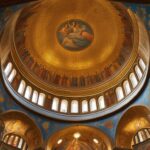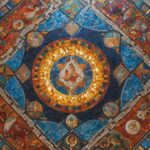Welcome to a spiritual journey like no other. In this article, we invite you to explore the profound depths of Eastern Orthodoxy, a rich and deeply theological faith that encompasses the beliefs and practices of Orthodox Christianity. Step into a world that is not simply a selection of Christian teachings, but a transformative commitment to the teachings and traditions of the Orthodox Church.
Key Takeaways:
- Eastern Orthodoxy is a rich and deeply theological faith.
- It encompasses the beliefs and practices of Orthodox Christianity.
- Orthodox Christianity is not a cafeteria-style approach to faith but a commitment to the teachings and traditions of the Orthodox Church.
A Personal Journey of Discovery
As the author of this article embarked on a personal journey of faith, they found themselves yearning for a deeper connection with their spirituality. Raised in a charismatic Christian home, they began to feel disillusioned with the modern American church scene. Seeking a more authentic and profound experience of Christianity, they set out on a path of exploration that would ultimately lead them to Eastern Orthodoxy.
Their search took them through various denominations and spiritual practices, each offering unique perspectives and insights. However, it was in the beliefs, traditions, and sacraments of the Orthodox Church that they discovered a sense of profound depth and authenticity.
Orthodox beliefs, rooted in ancient Eastern Christian traditions, emphasize the ontological change one experiences upon becoming Orthodox. It is not merely a set of doctrines to be accepted intellectually, but a commitment to a way of life that encompasses every aspect of one’s being. The author found solace in the profound spirituality and rich tapestry of Eastern Orthodox traditions, which provided them with a sense of belonging and purpose on their spiritual journey of discovery.
What is Orthodox Christianity?
Orthodox Christianity is a faith deeply rooted in a rich theological tradition that spans centuries. At the heart of Orthodox Christianity is a profound emphasis on mystery and symbolism, which is evident in its theology, liturgy, and worship practices. The Orthodox Church places great significance on maintaining continuity with ancient Christian beliefs and practices, making it a unique and distinct branch of Christianity.
One of the defining features of Orthodox Christianity is its liturgical worship. The Orthodox liturgy is a sacred and awe-inspiring experience, characterized by beautiful chants, the use of incense, and the veneration of icons. Icons, which are religious images or paintings, play a central role in Orthodox worship as they are seen as windows into the divine presence. These icons are not worshipped but rather serve as reminders of the saints and holy figures who have gone before, inspiring believers to strive for holiness and communion with God.
The Mystery of Orthodox Theology
Orthodox theology delves into the mystery of God and explores the relationship between the divine and the human. It teaches that God, in His essence, is unknowable and transcendent, yet reveals Himself to humanity through the person of Jesus Christ. The Eastern Orthodox Church emphasizes the importance of theosis, which is the process of becoming united with God and attaining likeness to Him. This concept underscores the transformative nature of the Orthodox faith, as believers are called to participate in the divine nature and strive for spiritual growth and holiness.
The Beauty of Orthodox Worship
The Orthodox liturgy is a vibrant and multisensory experience that engages believers on a spiritual and sensory level. The use of incense, music, and elaborate vestments creates an atmosphere of reverence and awe. The liturgy is conducted in a carefully choreographed manner, with specific rituals and gestures that have been passed down through generations. The beauty of Orthodox worship is not merely an aesthetic experience but a means of connecting with the divine and experiencing the presence of God.
Overall, Orthodox Christianity offers a unique and profound spiritual journey through its theology, liturgy, and worship practices. Its emphasis on mystery, symbolism, and theosis sets it apart from other branches of Christianity. The Orthodox Church invites believers to embark on a transformative faith journey, seeking a deep and meaningful connection with God through ancient traditions and the beauty of worship.
Discovering the Hidden Depths of Orthodoxy
As the author delves further into the depths of Eastern Orthodoxy, they uncover a rich and profound spirituality that is deeply rooted in the traditions of the Orthodox Church. Central to this exploration are the lives of Orthodox saints, who serve as beacons of inspiration and exemplars of the Orthodox spiritual path. The saints are revered for their holiness, their deep communion with God, and their unwavering faith.
Orthodoxy spirituality encompasses a wide range of practices and disciplines that are aimed at cultivating a deeper connection with the divine. One such practice is the use of the Jesus Prayer, a repetitive prayer that focuses on the name of Jesus and seeks to invoke His presence. This prayer, repeated with sincerity and humility, becomes a transformative tool for spiritual growth and communion with God.
“The saints are not just historical figures; their lives and teachings continue to resonate in the hearts of believers today. They serve as guides and intercessors, offering wisdom, encouragement, and inspiration on the journey of faith.”
Exploring the history of the Orthodox Church is also a significant aspect of uncovering its hidden depths. The Orthodox Church traces its roots back to the early Christian Church, with a rich history that spans centuries. Understanding the historical context, the struggles, and the triumphs of the Orthodox Church provides a deeper appreciation for its teachings and traditions.
Overall, delving into the hidden depths of Eastern Orthodoxy reveals a spirituality that is both ancient and timeless, a faith that is rooted in tradition yet relevant to the present day. It is a journey of discovery, a path that leads to a deeper understanding of God and a transformative experience of faith.
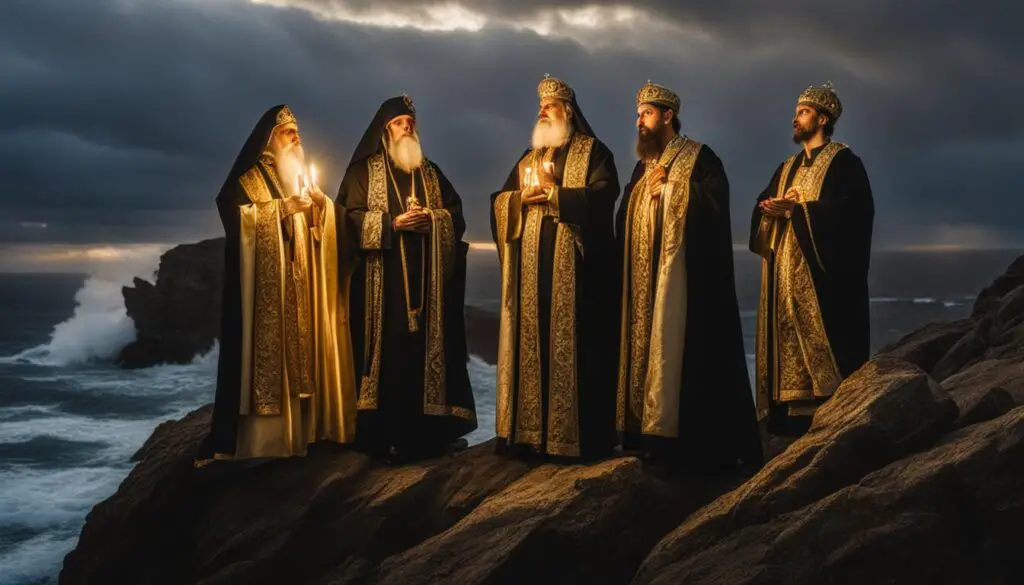
The Lives of Orthodox Saints
| Saint | Feast Day | Significance |
|---|---|---|
| Saint Anthony the Great | January 17 | Considered the father of monasticism, renowned for his spiritual wisdom and asceticism. |
| Saint Seraphim of Sarov | January 2 | A beloved Russian saint known for his radiant joy, miracles, and teachings on the acquisition of the Holy Spirit. |
| Saint Paisios of Mount Athos | July 12 | A modern-day saint revered for his deep spirituality, humility, and prophetic insight. |
| Saint Mary of Egypt | April 1 | A repentant sinner who spent years in the desert, living a life of extreme asceticism and attaining great spiritual heights. |
Losing and Finding Faith
Section 5 explores the author’s experiences within Protestantism and the subsequent spiritual searching that took place. Raised in a charismatic Christian home, the author initially found comfort and inspiration in their faith. However, as they grew older, they began to feel disillusioned with the modern American church scene. Dissatisfied with what they perceived as a shallow and consumeristic approach to Christianity, they embarked on a journey to find something more.
In their quest for depth and authenticity, the author explored different Christian denominations, seeking spiritual practices that resonated with their soul. They attended various churches, engaged in Bible studies, and even sought guidance from spiritual teachers. Yet, despite these efforts, they found themselves feeling lost and alone, longing for a deeper and more meaningful connection with God.
It was during this period of spiritual searching that the author discovered Eastern Orthodoxy. Intrigued by the ancient traditions, mystical aspects, and deep spirituality of Orthodoxy, they began to delve into the teachings and practices of this faith. This encounter marked a turning point in their spiritual journey, as they found solace and a renewed sense of purpose within the rich heritage of Orthodox Christianity.
In the author’s own words:
“I was yearning for something more in my faith journey. I wanted to encounter the divine in a profound and transformative way. Despite my efforts within Protestantism, I felt like I was only scratching the surface. It was through my spiritual searching that I stumbled upon Eastern Orthodoxy, and it felt like coming home. The depth, beauty, and mystery of the Orthodox tradition captivated me, and I knew I had found the spiritual path I had been seeking.”
| Protestantism | Eastern Orthodoxy | |
|---|---|---|
| Worship Style | Varies, but often focuses on contemporary music and preaching | Liturgy-centered, with chants, incense, and the use of icons |
| Authority | Emphasizes individual interpretation of Scripture | Places authority in the teachings of the Church Fathers and the Ecumenical Councils |
| Sacraments | Varies, with some denominations recognizing two sacraments (Baptism and Communion) and others recognizing additional sacraments | Recognizes seven sacraments, including Baptism, Chrismation, Eucharist, and others |
| Community | Varies, with a range of community sizes and structures | Strong emphasis on the communal nature of the Church, with a close-knit and supportive community |
| Spirituality | Emphasizes personal relationship with Christ and reliance on the Holy Spirit | Emphasizes theosis (union with God) and the cultivation of an inner life of prayer |
The Turning Point
The author’s journey of faith took a significant turn when they discovered the teachings of Eastern Orthodoxy. Through the videos and writings of spiritual teachers who had converted to Orthodoxy, they were introduced to a different paradigm of Christianity, one rooted in ancient traditions and deep spirituality. The allure of Original Christianity, with its rich history and profound connection to the divine, captivated the author’s heart and mind.
The ancient traditions of Orthodoxy became a beacon of light in the author’s spiritual search. They were drawn to the mystical aspects of the faith, the beauty of the liturgy, and the profound reverence for icons as windows into the divine presence. It was in the embrace of Orthodox spirituality that the author found a sense of depth and authenticity they had been longing for.
The discovery of Eastern Orthodoxy marked a turning point in the author’s faith journey. It led them to explore the depths of the Orthodox tradition, delving into its theology, practices, and historical roots. This newfound path offered a unique perspective on Christianity, one that resonated deeply with the author’s quest for truth and spiritual fulfillment.
![]()
As the author continued to immerse themselves in the teachings and practices of Eastern Orthodoxy, they experienced a profound transformation. The ancient traditions and spirituality of Orthodoxy became a source of healing, peace, and connection with the divine. The author found solace in the Orthodox spiritual community, embracing the communal worship experiences and the depth of relationship with God that they found within the Orthodox Church.
The turning point in the author’s faith journey came when they encountered Eastern Orthodoxy and its ancient traditions. The allure of Original Christianity and the depth of Orthodox spirituality resonated deeply with the author, providing a transformative path for their ongoing spiritual growth.
Embracing the Orthodox Tradition
Entering the Orthodox Church community for the first time can be an overwhelming experience. The unfamiliar rituals and traditions may leave newcomers feeling lost and uncertain. But for those who persevere, an incredible journey of discovery awaits.
Attending an Orthodox liturgical service is unlike any other worship experience. The beauty and depth of the rituals, the chants, the incense – all combine to create a sense of awe and reverence. It is a worship style that engages all the senses, inviting participants into a spiritual encounter that goes beyond words.
But it is not just the worship experience that draws people to the Orthodox Church. It is the welcoming nature of the community itself. Orthodox believers are known for their hospitality and willingness to embrace newcomers. From the moment one steps through the doors of an Orthodox church, they are greeted with warmth and openness.
“The Orthodox Church is like a family,” says Maria, a convert to Orthodoxy. “I felt a sense of belonging from day one. The community embraced me and became my support system on my journey of faith.”
As newcomers immerse themselves in the Orthodox tradition, they begin to engage in spiritual practices that have been handed down for centuries. From the daily rhythm of prayer to the veneration of icons, these practices become a grounding force in their lives. Through the guidance of experienced Orthodox spiritual mentors, they learn to deepen their prayer life, cultivate virtues, and grow in their relationship with God.
The Orthodox tradition offers a rich tapestry of spirituality, community, and worship. It is a journey that challenges and nourishes the soul, leading believers on a path of transformation and sanctification. For those who embrace the Orthodox tradition, it becomes a lifelong commitment to seeking God and experiencing His presence in every aspect of their lives.
The Challenges of Orthodoxy
In embracing the rich theological tradition of Eastern Orthodoxy, individuals may encounter various challenges. These challenges arise from the unique beliefs and practices of Orthodoxy, which may differ significantly from other Christian denominations. Navigating these challenges requires a willingness to explore and understand the underlying theology and spirituality of the Orthodox faith.
Orthodox Theology
Orthodox theology is deeply rooted in the teachings of the early Christian Church and is often characterized by its emphasis on mystery, symbolism, and theosis (the process of becoming one with God). For those coming from different theological backgrounds, Orthodox beliefs may require a paradigm shift, prompting a reevaluation of previously held convictions. The exploration of Orthodox theology may be intellectually rigorous, necessitating a willingness to engage with complex doctrines and scriptural interpretations.
Orthodox Beliefs and Practices
The Orthodox Church has a distinct set of beliefs and practices that are integral to Orthodox worship and daily life. These include the veneration of icons, prayers to the saints, and a hierarchical structure. Such practices may be unfamiliar or even challenging to those accustomed to a more individualistic or egalitarian approach to spirituality. It may require a period of adjustment and learning to understand the theological and historical foundations of these beliefs and practices.
The Orthodox Faith Journey
Embracing Orthodoxy is a transformative journey that demands personal commitment and dedication. This faith journey requires adherents to engage in ongoing spiritual growth, participating actively in the sacramental life of the Church and integrating Orthodox spirituality into their daily lives. It may involve challenges such as adjusting to the liturgical cycle, developing a consistent prayer rule, or reconciling personal experiences with Orthodox teachings. This journey of faith requires patience, humility, and a willingness to continually learn and grow.
| Challenges of Orthodoxy | Solutions |
|---|---|
| Orthodox theology may differ significantly from previous beliefs | Invest time in studying Orthodox theology, engage in conversations with experienced Orthodox Christians, and seek guidance from knowledgeable clergy |
| Unfamiliarity with Orthodox beliefs and practices | Attend services regularly, participate in catechesis and educational programs, and ask questions to deepen understanding and familiarity |
| Adjusting to the demands of the Orthodox faith journey | Stay committed, seek guidance from a spiritual mentor, and be open to transformation and growth through the practices and teachings of Orthodoxy |
Rediscovering Faith in Orthodoxy
Embracing the Orthodox tradition has been a transformative journey of spiritual growth for the author. They have experienced a deep connection with the divine and a sense of healing through the practices and community of Eastern Orthodoxy. The author’s faith has been revitalized as they have delved into the depths of Orthodox spirituality.
Within the Orthodox spiritual community, the author has found a supportive and nurturing environment for their faith journey. They have been embraced by the Orthodox Church and have found a sense of belonging and acceptance. The fellowship and communal worship have been essential in their rediscovery of faith.
Orthodoxy has also become a healing path for the author, offering solace and peace in their spiritual quest. The rich traditions, ancient rituals, and deep theological teachings of the Orthodox Church have provided a framework for understanding and experiencing God’s presence. Through prayer, liturgy, and the veneration of icons, the author has found a spiritual depth that nourishes their soul and brings them closer to God.
The author’s ongoing journey in Orthodoxy is marked by a continuous striving for spiritual growth. They are committed to deepening their understanding of Orthodox theology, exploring the wisdom of the saints, and integrating the teachings of the Church into their daily life. The Orthodox tradition has become a wellspring of wisdom and inspiration, guiding them on their path of faith and revealing new depths of spiritual truth.
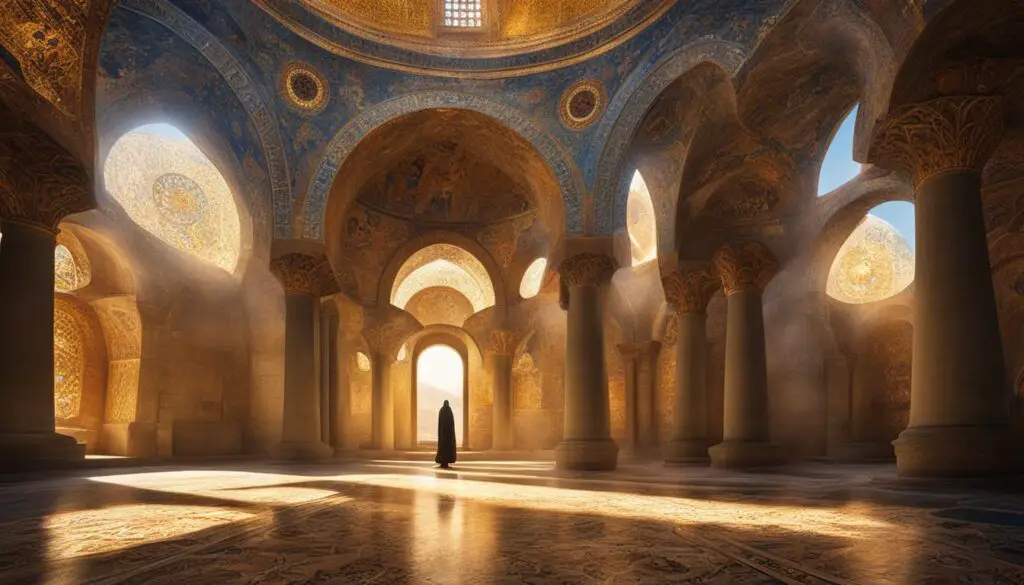
Orthodox Spiritual Community and Practices
In the Orthodox spiritual community, the author has found a supportive and nurturing environment for their faith journey. The community offers opportunities for fellowship, spiritual guidance, and shared worship experiences. Through participation in liturgical services, prayer groups, and educational programs, the author has been able to deepen their understanding of Orthodox spirituality and connect with others on a similar path.
Orthodox spiritual practices play a vital role in the author’s rediscovery of faith. The repetitive recitation of the Jesus Prayer, the use of icons in prayer and meditation, and the practice of fasting are all integral to their spiritual journey. These practices provide a sense of discipline, focus, and spiritual grounding in the midst of daily life. Through these practices, the author seeks to cultivate a deeper and more intimate relationship with God.
Orthodoxy as a Healing Path
Orthodoxy has offered the author a path to healing and restoration. The ancient traditions and rituals of the Orthodox Church provide a sense of continuity and stability in a rapidly changing world. The sacramental life of the Church, particularly the sacraments of confession and the Eucharist, offer opportunities for forgiveness, healing, and communion with God.
Furthermore, the emphasis on silence, stillness, and contemplation in Eastern Orthodoxy has allowed the author to find inner peace and cultivate a deeper awareness of God’s presence. Through the practice of hesychasm, or the prayer of the heart, the author has experienced moments of profound spiritual union and communion with the divine.
Conclusion
In concluding this faith journey, Eastern Orthodoxy has proven to be a profound and transformative path for the author. The depth and richness of Orthodox Christianity have provided a sense of spiritual fulfillment and a connection to the divine that they had been longing for. The author’s commitment to Orthodox teachings and traditions has been unwavering, and they are grateful to have discovered this ancient and profound faith.
The exploration of Eastern Orthodoxy has challenged the author to delve into the depths of theology, liturgy, and spirituality. They have found solace in the beauty of Orthodox worship, the depth of its beliefs, and the sense of community within the Orthodox Church. Through encounters with the sacraments, icons, and the engagement of Orthodox spiritual practices, the author has experienced profound healing and a renewed sense of faith.
This faith journey is an ongoing one, as the author continues to grow and learn within the embrace of Eastern Orthodoxy. They understand that Orthodoxy is not simply a set of beliefs, but a transformative way of life that requires continual exploration and commitment. As they move forward, the author is eager to continue diving deep into the teachings and practices of the Orthodox Church, knowing that their faith journey will continue to unfold within this sacred tradition.
FAQ
What is Eastern Orthodoxy?
Eastern Orthodoxy is a branch of Christianity that encompasses the beliefs and practices of Orthodox Christianity.
What is the difference between Eastern Orthodoxy and other Christian denominations?
Eastern Orthodoxy emphasizes the mystery and symbolism of the faith, with a central focus on the liturgy, icons, and ancient traditions.
What is the liturgy in Orthodox worship?
The liturgy is the worship service in Eastern Orthodoxy, characterized by beautiful chants, incense, and the use of icons.
Why are icons important in Orthodox worship?
Icons are considered windows into the divine presence and play a significant role in Orthodox worship.
What is the spiritual significance of Orthodox saints?
Orthodox saints are seen as examples of holiness and their lives are studied and honored for spiritual growth.
How does Orthodoxy connect to the early Christian Church?
Orthodoxy traces its roots back to the early Christian Church and maintains a connection to its traditions and teachings.
What led the author to explore Eastern Orthodoxy?
The author’s search for depth and authenticity in their faith journey led them to explore the beliefs, traditions, and sacraments of the Orthodox Church.
What challenges did the author face in embracing Orthodox theology?
The author grappled with concepts such as praying with the saints, submission to hierarchy, and the exclusive claims of Orthodoxy.
How did the author find a sense of home within the Orthodox tradition?
The author immersed themselves in Orthodox spiritual practices and found a welcoming community and a deep sense of belonging.
What is the overall conclusion of the author’s faith journey?
The author expresses gratitude for finding the depths of Eastern Orthodoxy and a commitment to continuing their exploration of its teachings and practices.



